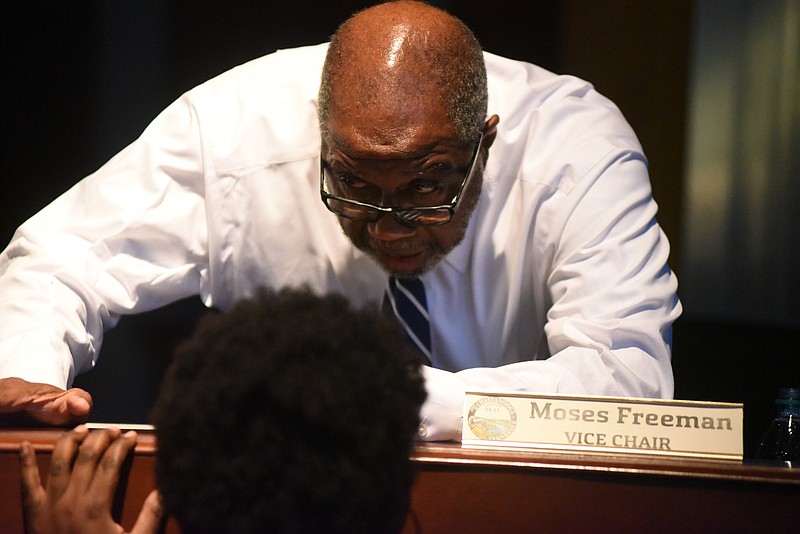Read more
Chattanooga to consider new city-wide minimum wage
If you have a job, you'd like a raise, especially if you believe you deserve one. That's true whether you're a corporate executive or a burger flipper.
A Chattanooga councilman has suggested the city increase the minimum wage within its municipal boundaries, giving those on the lower end of the economic spectrum a raise.
Now, Councilman Moses Freeman hasn't put out specifics, hasn't put forth legislation and only asked his fellow council members to support such a proposal and the city attorney to research it, so it's impossible to predict exactly what might or might not happen.
But, as cities such as Seattle, San Francisco and Los Angeles are finding out, raising the minimum wage is no panacea.
The restaurant and hotel industries, where a large number of minimum-wage workers are employed, have lost jobs in all three cities since the wage raises were implemented. In San Francisco and Seattle, according to Mark Perry of the American Enterprise Institute, Adam Ozimek of Moody's Analytics and Stephen Bronars of Edgewood Economics, restaurant employment figures are down 2,500 in San Francisco and the food service employment figures are down 1,100 in Seattle.
Even before the recent rate increase in San Francisco, the California city had held - for some time - the nation's highest minimum wage at $10.47 an hour. But, according to a 2014 Brookings Institution report, the city is second behind only Atlanta in income equality among the nation's top 50 cities.
Even the federal government understands this. The Congressional Budget Office in 2014 found that increasing the minimum wage from its current $7.25 an hour to $10.10 an hour would cost 500,000 jobs nationally.
This is Economics 101, after all.
If employers are barely getting by in a sluggish economy, raising the hourly salary of their employees means they won't have enough money to pay for other expenses (rent, electricity, supplies). Otherwise, they must lay off some employees to pay others the new minimum wage, or they must raise prices (which means fewer people will be able to buy what they are selling). And they certainly won't have additional jobs to offer.
It's that simple.
If the economy were roaring, and hadn't been held back by the cost of regulation, tax increases and the Affordable Care Act the last six-plus years, the case could be made for a sizable minimum-wage rise. As it is, even with an unemployment rate of 5.1 percent, the national labor-participation rate is only 62.6 percent, the lowest since the Carter administration. And the country has a few more people than it did in the late 1970s.
Remember, too, that minimum-wage employment is supposed to be entry-level employment, not family-of-six sustaining employment. If an employee works hard and learns more skills, her employer awards her with a raise and a new position or she finds a job at another business where she makes more money.
Chattanooga Councilman Larry Grohn had it right when he told Times Free Press staff writer Louie Brogdon on Tuesday that the market and not the government should determine wages.
"I think our push should be job training and education," he said. "If you want to reduce the number of entry-level jobs, you increase the minimum wage."
An increased minimum wage would be particularly bad news for young people, who normally are expected to be the top candidates for minimum-wage jobs. In July, labor-force participation for teens ages 16-19 in the United States was at 33.5 percent, the fifth lowest level since the Bureau of Labor Statistics began compiling such data in 1948. Four of the five lows have occurred in the past 18 months.
Besides all the economic reasons against a minimum-wage hike, in Tennessee there's also a legal reason. A 2013 law passed by the General Assembly forbids cities to raise the minimum wage above the federal and state levels for companies with which it contracts.
A better idea is for businesses that are thriving to raise their minimum wages, as the likes of Wal-Mart, Target, Costco and McDonald's have done.
Even the city of Chattanooga pays more than the minimum wage - $11.95 an hour is its lowest pay - because it can.
Councilman Freeman, and others who support his idea, no doubt want lower-paid Chattanoogans to be better off. We'd second that. But a municipality mandating wages in private businesses in a sputtering economy is not the way to go. Its effect is likely to reduce jobs, to drop full-time jobs to part-time jobs, and - when the Census Bureau is reporting business closures are exceeding business startups for the first time since it began compiling the data - to cause businesses to fail.
